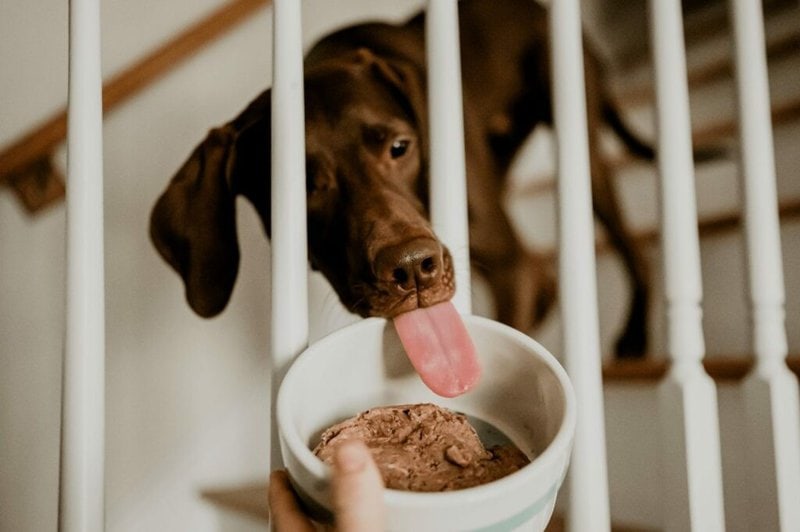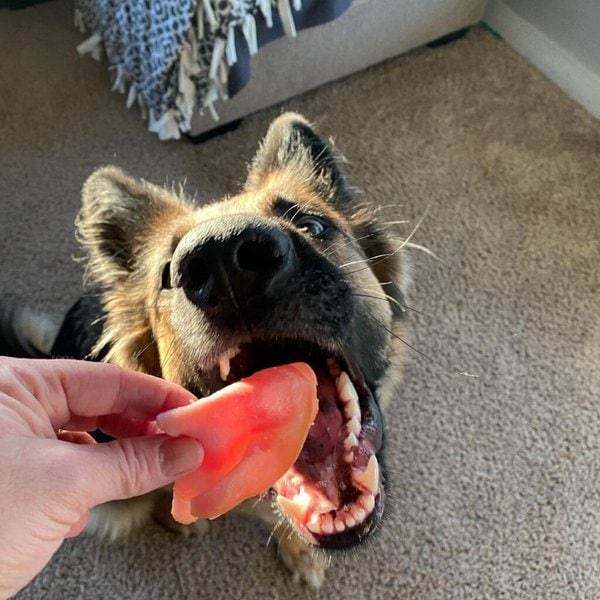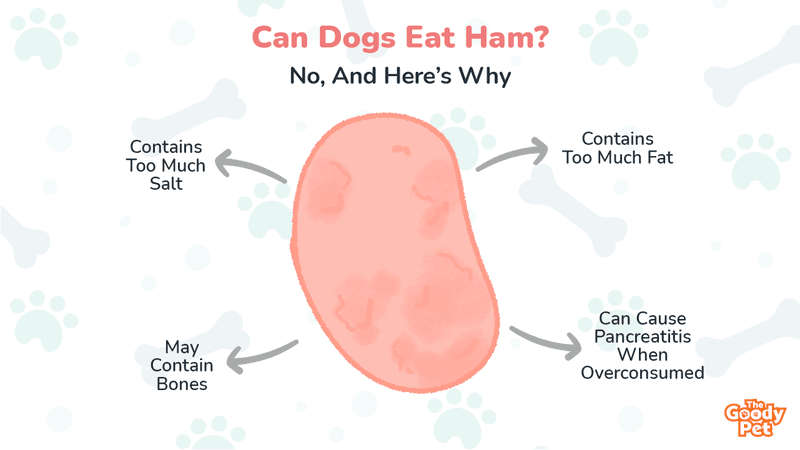We need to be conscientious about the foods we share with dogs as they can be more harmful, depending on how they are prepared. Ham is one of those controversial meals. When you’re enjoying or cooking ham, especially during Christmas, you may sometimes wonder if it is okay to give your dog a little piece. Dogs require protein in their diet, and ham is an excellent source of protein, but is ham safe for dogs?
Dogs cannot have ham because it is not safe for them to consume. Although small pieces of ham might not be lethal or cause any medical issues to your dog, there are several things you should consider before feeding your dog ham. High sodium content is one primary reason why ham is considered harmful for a dog and may lead to salt poisoning if taken in large quantities.
Dogs will often require a balanced diet, and a sudden influx of sodium or sugar might cause diarrhea, vomiting, or other serious complications. There are more nutritious and much safer sources of protein that would be better for your dog. Still, wondering why your dog can’t consume ham? Here’s what you need to know about feeding ham to dogs.
Is Ham Harmful To Dogs?

Yes. Ham shouldn’t be a large portion of the dogs’ diet and shouldn’t be used regularly. There are better sources of protein to provide the dogs with more nutritional benefits. Instead of feeding it to dogs, ham is best left for human consumption.
Where Does Ham Come From?
Ham is common meat that is consumed widely by humans, and it comes from the hind leg of a pig. It can either be cooked on or off the bone. It is often prepared as meat for dinners or celebrations and is sometimes cut into smaller slices to be used in sandwiches.
Sometimes, ham might be cured before cooking. This implies that the meat will be treated with salt, sugar, or brine, and manufacturers might also add other chemicals like sodium nitrate.
You can use different ways to cook or prepare ham, which may impact its suitability as a meal for dogs.
How Much Ham Is Too Much For A Dog?
There is no straightforward or simple answer to this question. How much ham your dog can consume is dependent on the dog’s health status and size.
A tiny bit of cooked ham can be used as an occasional treat for a healthy and big dog. However, a pet with a sensitive stomach as well as other health conditions may react terribly, even to a small piece of ham.
Why Can’t Dogs Have Ham?

Although ham provides a good source of protein, it is not the best human food that you can offer to a dog. This is because if eaten in large quantities, it can cause more harm than good. Small amounts of ham might be okay, depending on the individual dog.
However, if your dog has a sensitive stomach, consumption of ham may cause even more problems. There are a number of reasons why ham may be harmful to your dog’s health. They include;
High Salt Content
Ham has a lot of salt that can cause salt toxicity. This is because ham is often cured with salt and other sodium compounds.
Salt is not always good for dogs, especially when consumed in large amounts. In fact, some dogs benefit from a low-sodium diet. Therefore, if the dog consumes the ham, then a risk of salt toxicity arises.
At first, this may be seen as increased urination and thirst. However, in the most severe cases, the symptoms of salt toxicity will include diarrhea, tremors, vomiting, or sometimes seizures. Consult your vet if you suspect the dog has consumed a large portion of ham.
High-Fat Content
Ham has a high-fat content which may be harmful to dogs. While high-fat meat is very appealing to humans and dogs, they should only consume it in small quantities. This way, it won’t cause too much of a problem.
However, some dogs may be sensitive to fatty meat, and consuming ham may cause a bad reaction. It is very common for dogs to experience digestive upsets after consuming large quantities of ham. Some symptoms may include diarrhea and vomiting that can become very problematic in severe cases.
Your dogs may also experience significant gastric upset that may lead to dehydration. Furthermore, dogs that consume large amounts of ham are prone to pancreatitis, where the pancreas becomes inflamed as it reacts to the excess fats.
Generally, a high-fat content may mean that ham is high in calories. As a result, too much ham may make your dog become obese, leading to other serious complications. Ham should be avoided at all costs when it comes to feeding overweight dogs and ensuring the dogs’ health.
Harmful Bones
The piece of ham you’re feeding your dog may contain bones that can be a severe splinter or choking hazard. It can also cause damage to the dog’s gut, gums, and mouth.
When cooked, ham becomes softer, making them an even higher risk to your dog. This is because when your dogs chew the cooked bone, they are more likely to get choked or cause damage to the gut and mouth.
However, raw bones are not recommended either as they may damage the dog’s teeth and carry some harmful bacteria.
What Happens If A Dog Eats Ham?
When a dog consumes a small amount of ham, it is very unlikely that the dog will have any effects. However, dogs are different, and some dogs may not tolerate even that small amount of ham.
The most common problem or issue that is experienced by a dog who has eaten ham is digestive problems, for example, diarrhea, excessive drooling, and vomiting. These symptoms may be short-lived and mild but can also be very severe.
In some cases, eating ham may cause a condition called pancreatitis, which leads to excessive vomiting and severe pain. Their appetite will most likely reduce, and you will notice that your dog has lost some weight.
Other signs of excessive ham consumption you should watch out for include;
- Lethargy or sluggishness
- Lost appetite or not wanting to eat
- Excessive drooling
- Abdominal pain

What Should I Do If My Dog Eats Ham?
If you see any of these signs after the dog consumes ham, it is always a great idea to seek advice from a vet. For instance, treatment for pancreatitis may include a bland diet, anti-sickness medication and pain relief drugs. If the dog is vomiting too much, then there is a risk of dehydration. As a result, the need for an IV drip may arise to replace the lost fluids.
Is There Any Ham That Is Safe For Dogs?
Although there is no type of ham found to be entirely safe for dogs, it is a good idea to go for a high-quality ham that has undergone minimal processing. Once you get one, soak it in water to ensure it has drained as much salt as possible.
Generally, ham is cooked or cured to make it less suitable for the dog to consume. It is a fatty meat, and although it is an excellent source of protein, there are other nutritious options that are much better to feed your dog.
If your dog consumes a lot of ham, it may lead to unwanted effects like digestion problems. So, if you want to feed ham to your dog safely, consider feeding in moderation or a very tiny amount. Also, don’t allow your dog to consume the ham very often, and if you notice a reaction, stop!
Things To Consider Before Feeding Your Dog Ham
Before you allow your dog to feed on ham, here are some crucial tips you should consider;
- Ham bought from the stores may contain a lot of sodium. Unfortunately, this is what most people use, and it is not suitable for people or dogs. Furthermore, this ham is loaded with preservatives such as nitrites and nitrates, which are both sodium-based. As mentioned earlier, salt can be toxic to dogs and can lead to even more severe complications.
- Although ham is a good source of protein, which the dogs need, there are much better protein sources available. Some people find ham a highly digestible protein, while others say it is not as easily digested as other meals.
- While dogs need fat in their diet, most dog foods will have the required amount of fat to meet your dog’s needs. The fatty content in the ham might make it difficult to digest the ham, especially when the fat content is too high.

Can Dogs Safely Eat Ham Bones Or Ham Hocks?
Ham hocks are considered not safe for dogs because they have bones. These hocks are made from a joint which connects the pig’s leg to the foot. They are very large and can cause choking and other digestion problems.
The cooking process will soften the bone but will still cause damage to the dog’s mouth. Another possible concern is bowel obstruction. The bone pieces may be very sharp such that they piece through the gut, which can lead to a potentially life-threatening situation.
Additionally, raw ham bones may contain harmful bacteria that may interfere with your dog’s health. They are more brittle than other bones and may splinter more easily. As a result, it is best to avoid giving your dog ham bones and ham hocks too.
Can Dogs Eat Ham Fat Or Rind?
No. Although it is tempting to feed your dog with offcuts from ham whenever you remove them, it is not always a good idea.
The ham fat and ham rind are some of the fattiest parts of the ham, which could potentially cause a risk of obesity, diarrhea, and other severe conditions.
Furthermore, these parts have no nutritional benefit to the dogs. For this reason, they are best avoided at all costs.





